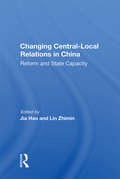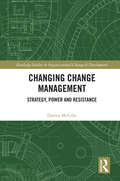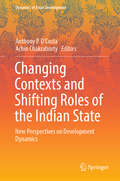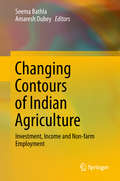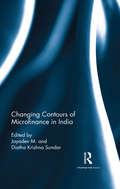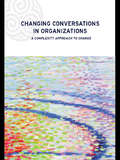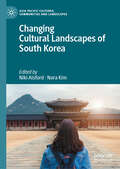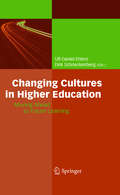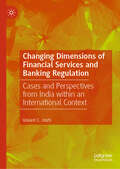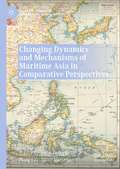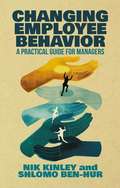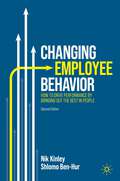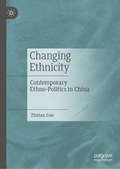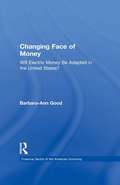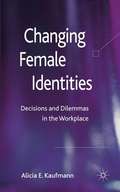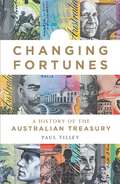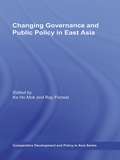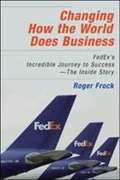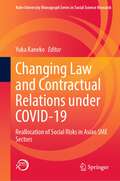- Table View
- List View
Changing Central-local Relations In China: Reform And State Capacity
by eter Tsan-Yin ChungThis volume provides a comprehensive analysis of the profound changes in Chinas central-local relations since the late 1970s. Lending insight into a crucial component of Chinas current political economy and the transformation of state socialism, the contributors challenge conventional wisdom that state power rests in the traditional dichotomy of st
Changing Change Management: Strategy, Power and Resistance (Routledge Studies in Organizational Change & Development)
by Darren McCabeThe literature on Change Management works from the premise that management possesses the power to achieve change and this is evident in that resistance is little more than a footnote in most textbooks. This assumption sits uneasily, however, with the high failure rate of Change Management interventions. This book seeks to explain this paradox by providing a critical ‘relational’ approach towards Change Management. What would a book on Change Management look like that takes resistance seriously? This book attempts precisely this by exploring how resistance is as much a part of change as the strategies of those that seek to enact it. The findings are drawn from a qualitative study of organizational transformation in a Local Government Authority in the UK. Its detailed empirical insights enable readers to explore organizational change from many different perspectives considering issues such as the strategic use of metaphor and counter-metaphors; management and employee resistance; organizational politics and cynicism. It will be of interest to researchers, academics, and students interested in change management, organizational studies, human resource management, and critical management studies.
Changing Contexts and Shifting Roles of the Indian State: New Perspectives on Development Dynamics (Dynamics of Asian Development)
by Anthony P. D’Costa Achin ChakrabortyThis book critically discusses the changing relationship between the Indian state and capital by examining the mediating role of society in influencing developmental outcomes. It theorizes the state’s changing context allowing the discussion of its pursuit of contradictory economic and social welfare goals simultaneously. Both structural and ideological factors are argued to contribute to a shifting context, but the centrality of re-distributive politics and the contradictions therein explain a lot of what the state does and cannot do. The book also examines what the state aspires to do but structurally cannot accomplish either because of the scale of the problem or the dysfunctionality that sets in with continuous reforms. The collection provides rich evidence on the contested forms of governance arising from changing contexts and shifting roles of the state. Readers will benefit from this recasting of the Indian state in terms of the actual forms of intervention today.Changing Contexts and Shifting Roles of the Indian State is a timely book. At a time when the question of the role of the state in promoting more inclusive forms of development has never been more urgent, this book provides a range of powerful and insightful case studies of how a changing Indian capitalism is impacting and in turn being impacted by the the multi-stranded role of the Indian state. Patrick Heller, Professor of Sociology and International Affairs, Brown University, Providence.Since the early 1990s, the Indian economy has moved away from a statist model of development to a more market-oriented one. However, very little scholarship exists that attempts to analyse India’s recent development experience from a political economy lens. This book, which is edited by two of India’s reputed scholars in the political economy of development, addresses this important gap in the literature. It provides an insightful account of the role of the state and the market in India’s economic resurgence in the last three decades. The book also contributes to a fresh understanding of what is meant by a twenty-first century developmental state in a globalised world. The book will be valuable reading for all scholars of India, as well as to researchers in the political economy of development. Kunal Sen, Director, United Nations University – World Institute for Development Economics Research (UNU-WIDER), Helsinki.This collection gives us a richer and more layered understanding of the Indian contemporary State. Rather than see the State as an unchanging entity with unchanging interests, the book argues that the role of the State changes with the context and with the change in political regime. Thus, taking contradictory decisions such as greater dispossession of land from the peasantry and expansion of the universe of economic rights is explainable. The argument is that we can have a better understanding when we see the Indian State as dealing with the ebb and flow of a democracy. C. Rammanohar Reddy, Former Editor, Economic and Political Weekly, Mumbai.
Changing Contours of Indian Agriculture: Investment, Income and Non-farm Employment
by Seema Bathla Amaresh DubeyThis book presents an extensive study on India's agricultural and nonfarm sectors, examining prices, investments and policies, and suggesting various essential technological changes. It offers appropriate financial, institutional, and policy frameworks that can help to sustain agricultural growth and augment farmers' incomes across geographical locations. Further, it addresses agricultural growth and rural poverty reduction through multiple pathways that also tackle varied geographical locations, making it a highly useful guide to understanding the changing contours in agriculture and rural areas across the country and among rural households with various social and economic backgrounds.
Changing Contours of Microfinance in India
by Jayadev M. Diatha Krishna SundarThis book brings together empirical evidences and theoretical perspectives to provide a comprehensive overview of the microfinance sector in India. The essays in the volume: focus on the application of information and communication technology (ICT) solutions in microfinance institutions to strengthen the savings movement and widen credit access to the poor and marginalized sections of society; present case studies on self-help group (SHG) movements, federations and SHG-Bank Linkage programmes; propose measures for strengthening regulatory and governance structures of the microfinance sector; and identify linkages between overall financial inclusion and the contribution of microfinance institutions (MFIs). The volume will be indispensable for scholars and researchers of microeconomics, South Asian economics and development economics as well as professionals and aspirants in the microfinance, rural banking and financial inclusion sectors.
Changing Conversations in Organizations: A Complexity Approach to Change (Complexity and Emergence in Organizations)
by Dr Patricia ShawDrawing on the theoretical foundations laid out in earlier volumes of this series, this book describes an approach to organizational change and development that is informed by a complexity perspective. It clarifies the experience of being in the midst of change. Unlike many books that presume clarity of foresight or hindsight, the author focuses on the essential uncertainty of participating in evolving events as they happen and considers the creative possibilities of such participation.Most methodologies for organizational change are firmly rooted in systems thinking, as are many approaches to process consultation and facilitation. This book questions the suggestion that we can choose and design new futures for our organizations in the way we often hope. Avoiding the widely favoured use of two by two matrices, idealized schemas and simplified typologies that characterize much of the management literature on change, this book encourages the reader to live in the immediate paradoxes and complexities of organizational life, where we must act with intention into the unknowable. The author uses detailed reflective narrative to evoke and elaborate on the experience of participating in the conversational processes of human organizing. It asserts that possibilities are perpetually sustained and changed by the conversational life of organizations.This book will be valuable to consultants, managers and leaders, indeed all those who are dissatisfied with idealized models of change and are searching for ways to develop an effective change practice.
Changing Cultural Landscapes of South Korea (Asia Pacific Cultures, Communities and Landscapes)
by Niki Alsford Nora KimThis book provides a comprehensive exploration of the profound transformations in the cultural and physical landscapes of South Korea, with an interdisciplinary approach that draws from anthropology, sociology, and human geography. The authors delve into the dynamic interplay between tradition and modernity in a nation that has experienced rapid development, technological innovation, and significant socio-cultural changes. With contributions from experts across various fields, this book examines how South Korea&’s distinctive path of modernisation is reshaping both the tangible and intangible aspects of its society. Organised around four key themes—Gender and the Media Landscape, Religion and Social Movements, the Ethno-racial Landscape, and the Traditional Landscape—it presents diverse perspectives on the interconnected forces driving rapid societal change. Together, these insights offer a nuanced understanding of one of the world&’s most dynamic societies. This book is an essential resource for scholars, students, and practitioners in South Korean and East Asian studies, as well as the broader disciplines of cultural geography, anthropology, and sociology.
Changing Cultures in Higher Education: Moving Ahead to Future Learning
by Ulf-Daniel Ehlers Dirk SchneckenbergMore and more educational scenarios and learning landscapes are developed using blogs, wikis, podcasts and e-portfolios. Web 2.0 tools give learners more control, by allowing them to easily create, share or reuse their own learning materials, and these tools also enable social learning networks that bridge the border between formal and informal learning. However, practices of strategic innovation of universities, faculty development, assessment, evaluation and quality assurance have not fully accommodated these changes in technology and teaching. Ehlers and Schneckenberg present strategic approaches for innovation in universities. The contributions explore new models for developing and engaging faculty in technology-enhanced education, and they detail underlying reasons for why quality assessment and evaluation in new - and often informal - learning scenarios have to change. Their book is a practical guide for educators, aimed at answering these questions. It describes what E-learning 2.0 is, which basic elements of Web 2.0 it builds on, and how E-learning 2.0 differs from Learning 1.0. The book also details a number of quality methods and examples, such as self-assessment, peer-review, social recommendation, and peer-learning, using illustrative cases and giving practical recommendations. Overall, it offers a step-by-step guide for educators so that they can choose their own quality assurance or assessment methods, or develop their own evaluation methodology for specific learning scenarios. The book addresses everyone involved in higher education - university leaders, chief information officers, change and quality assurance managers, and faculty developers. Pedagogical advisers and consultants will find new insights and practices for the integration and management of novel learning technologies in higher education. The volume fosters in lecturers and teachers a sound understanding of the need and strategy for change, and it provides them with practical recommendations on competence and quality methodologies.
Changing Dimensions of Financial Services and Banking Regulation: Cases and Perspectives from India within an International Context
by Vasant C. JoshiThis book provides a review and preview of important emerging challenges facing financial regulators across the globe ranging from Federal Reserve (USA) to the Bank of Japan. It takes a perspective to anticipate where these challenges lie. Wherever appropriate, the book further examines these matters in the Indian context. Anticipating that central banks will be dealing with the after-effects of &“do what it takes&” monetary policy adopted during and after the financial crisis brought about by the pandemic, the book explores through its eleven chapters topics such as -- a balanced assessment of risk management with a particular focus on Basel III; a discussion on large technology, digital finance, and digital insurance; climate change and its attendant risks; cyber-crime; cryptocurrencies; impact of pandemic, bankruptcy, and so on. The book is aimed at banks staff, regulators, and accountancy firms as well as at graduate and post-graduate students specializing in economics, commerce,finance, and management.
Changing Dynamics and Mechanisms of Maritime Asia in Comparative Perspectives (Palgrave Studies in Comparative Global History)
by Hong Liu Shigeru Akita Shiro MomokiThis book attempts to reveal historical dynamism of transforming contemporary Maritime Asia and to identify key driving forces or agencies for the evolution and transformation of Maritime Asia in the context of global history studies. It seeks to accomplish these goals by connecting different experiences in Maritime Asia both historically from the late early-modern to the present and spatially covering both East and Southeast Asia. Focusing on interactions on and through oceans, seas, and islands, Maritime Asia can deal with any aspects of human society and the nature, including diplomacy, maritime trade, cultural exchange, identity and others. Its interest in supra-regional interactions and networks, migration and diaspora, combined with its microscopic concern with local and trans-border affairs, will surely contribute to the common task of contemporary social sciences and humanities, to relativize the conventional framework based on the nation-state. In this regard, research in Maritime Asia claims to be an integral part of global studies. Part I deals with long-distance trade and diplomatic relations during the late early modern era and its transition to the modern era, mainly in the nineteenth century. Part II focuses on the emergence of transregional and trans-oceanic Asian networks and the original institution-building efforts in the Asia-Pacific region in the twentieth century.
Changing Employee Behavior
by Shlomo Ben-Hur Nik KinleyAn important part of every manager's job is changing people's behavior: to improve someone's performance, get them to better manage relationships with colleagues, or to stop them doing something. Yet, despite the fact that changing people's behavior is such an important skill for managers, too many are unsure how to actually go about it. This book reveals the simple, but powerful techniques for changing behavior that experts from a range of disciplines have been using for years, making them available to all managers in a single and comprehensive toolkit for change that managers can use to drive and improve the performance of their staff. Based on research conducted for this book, it introduces practical techniques drawn from the fields of psychology, psychotherapy, and behavioral economics, and show how they can be applied to address some of the most common, every-day challenges that managers face. #changingpeople
Changing Employee Behavior: How to Drive Performance by Bringing out the Best in People
by Shlomo Ben-Hur Nik KinleyAn important part of every manager's job is changing people's behavior: improving someone’s performance, helping them better manage relationships with colleagues, or sometimes even stopping them doing something. Yet, despite the fact that changing people's behavior is such a fundamental skill for managers, there is little in the way of systematic support for them to go about it.This book changes that, revealing simple but powerful techniques for changing behavior that experts from a range of disciplines have been using for years. Drawing upon proven methods from psychology, psychotherapy, and behavioural economics, it presents a comprehensive toolkit that managers can use to improve the performance of staff and address some of the most common challenges they face. With a new foreword and three new chapters, this revised edition expands on the original by showing how organisations and leaders have used the techniques presented in it, how these methods have become even more relevant in the post-pandemic world, and how it has been applied the broader challenge of workplace culture change. Finally, supplementary videos add detail to this new content, with examples and explanations presented by the authors.Videos via app: download the SN More Media app for free, scan a link with play button and access videos directly on your smartphone or tablet.
Changing Ethnicity: Contemporary Ethno-Politics in China
by Zhitian GuoThis book investigates the changes in ethnicity in contemporary China by examining the Yi in Liangshan. With a particular focus on cadres, a seemingly highly politicized group, this book tries to contribute to the discussion of ethnopolitics in China and the politicization of ethnicity. This study categorizes cadres into three generations and discovers that for the veteran echelon ethnicity is related to an emotional expression, for the second generation it is more about a political discourse and competitions, and for the third generation it takes the form of symbolic ethnicity that resonates in everyday life. Changing ethnicity of Yi is a miniature portrayal of the social development in China and demonstrates the interplay between ethnicity and ethnopolitics and how these interactions are expressed in people’s everyday life. The valuable context offered in this book for discussions about ethnicity in contemporary China will be of interest to China scholars, ethnologists, and political scientists.
Changing Face of Money: Will Electric Money Be Adopted in the United States? (Financial Sector of the American Economy)
by Barbara Ann GoodAlthough the cashless society has been predicted for at least twenty years, the new forms of card-based and software based electronic money may prove to be a partial alternative to the current forms of payment. This study examines these emerging electronic money systems and their possible adoption, primarily in the United States.
Changing Female Identities
by Alicia E. KaufmannChanging Female Identities explores the influence of parental figures, the role models that women adopt, the diverse feelings that arise as a result of family mandates and the emotions that arise from cooperation or competition among siblings.
Changing Fortunes: A History of the Australian Treasury
by Paul TilleyTreasury has been at the centre of every major economic policy issue the Australian Government has faced, its role evolving from the government's bookkeeper at Federation in 1901 to the economic policy advising agency it is today. Throughout its history Treasury has been a robust and stable institution with a consistent market-oriented economic framework - but its policy influence has waxed and waned. It has supported reformist Treasurers such as Keating and Costello, and been a voice of caution when political imperatives have pushed governments down economically damaging paths. At times, though, Treasury advice has been ignored and it has been pushed out into the cold. Amidst the political chaos of recent times, Treasury has been dragged closer to government and become a less effective policy adviser. The consequent lack of a consistent government economic reform narrative over the last decade is plain for all to see. Changing Fortunes tracks Treasury's history since Federation, with a focus on the modern era since its 1976 split with Finance.
Changing Gear: Creating the Life You Want After a Full On Career
by Jan Hall Jon Stokes'Changes occur all the time. They can be identifiable and dramatic, or they can emerge imperceptibly, creeping up on you until one day you realise your foundations are less solid than you imagined. At this point in your life you need to find a new path.'Coping with transition can be hard at every stage of life, but it presents unique challenges as we come to the time of our lives when we are facing the end of full-on, full-time work. Changing Gear looks at why work is such an important part of a person's identity, and how challenging it can be when it's time to change gear, whether that's to explore a new path or take a step back from our careers entirely. Offering insight, advice and practical exercises to help you make the right decisions, this valuable guide gives you the tools to navigate complicated situations, identify what's most important, and develop the skills you need to cope with change.
Changing Gear: Creating the Life You Want After a Full On Career
by Jan Hall Jon Stokes'Changes occur all the time. They can be identifiable and dramatic, or they can emerge imperceptibly, creeping up on you until one day you realise your foundations are less solid than you imagined. At this point in your life you need to find a new path.'Coping with transition can be hard at every stage of life, but it presents unique challenges as we come to the time of our lives when we are facing the end of full-on, full-time work. Changing Gear looks at why work is such an important part of a person's identity, and how challenging it can be when it's time to change gear, whether that's to explore a new path or take a step back from our careers entirely. Offering insight, advice and practical exercises to help you make the right decisions, this valuable guide gives you the tools to navigate complicated situations, identify what's most important, and develop the skills you need to cope with change.
Changing Governance and Public Policy in East Asia (Comparative Development and Policy in Asia)
by Ray Forrest Ka-Ho MokThe search for good governance has become an increasingly important element of public policy and public management and is high on the political agenda of East Asian countries. The need for robust governance structures and institutions was brought into sharp focus by the Asian Financial Crisis which adversely affected most East Asian societies. Since then they have begun to look for ways to restructure their public administration and political systems in order to develop new mechanisms and structures to promote good governance. This book focuses on how selected Asian states have responded to the growing impact of "liberalizing and marketizing trends" in public policy formulation and public management. To what extent is the "state-guided" regime in Asia still relevant to governing public policy / public management? What are the policy implications for a growing number of Asian states which are pursuing more pro-competition policy instruments? The book is a timely and important collection that offers critical analysis of the search for new governance in Asia and compares and contrasts experiences in selected Asian societies such as China, Japan, Hong Kong, Taiwan, South Korea, Singapore, and other parts of South East Asia. Chapters are written by leading scholars in the fields of comparative development, policy and governance studies from Hong Kong, Macau, Taiwan, China, Singapore, Japan and the United Kingdom.
Changing How the World Does Business: FedEx's Incredible Journey to Success
by Roger FrockFrom one of the founding executives of FedEx comes the first full inside story of how Fed Ex came to be one of the world's most successful, innovative, and admired companies in the US.
Changing How the World Does Business: Fedex's Incredible Journey to Success - The Inside Story
by Roger FrockFrom humble beginnings, FedEx has literally revolutionized the way business is conducted. Not too long ago, overnight shipping was barely an option for even the largest companies. Today, thanks to FedEx, it's available to every living room start-up. With annual revenues of $30 billion, more than 250,000 employees, 600 aircraft, and 70,000 surface vehicles, FedEx handles nearly six million shipments a day in two hundred countries. FedEx has become a household name, and has been named one of the top ten of America's Most Admired Companies by Fortune magazine. But it wasn't always easy. From his inside vantage point as the company's first general manager and chief operating officer, Roger Frock reveals the remarkable details of how Fred Smith and his team endured their tumultuous early years--fraught with a seemingly unending series of legal, financial, and operational crises that continually threatened the company's ability to stay in business--and, in the end, created an entirely new industry. Frock chronicles the dramatic last-minute saves and turnarounds the company engineered from its inception to the present. He entertains with stories of the trials and tribulations of the company's early struggles and victories--from Pilots using personal credit cards to fuel planes, to the courier who hocked his watch to put gas in his delivery van, and, one of the most memorable episodes, the time that founder Fred Smith literally gambled the company's last remaining funds to keep the planes flying. Frock's story introduces all the players--FedEx's resourceful and resilient leaders and employees--and shows how these remarkable individuals gave Fred Smith's original concept wings and, through flexibility, creativity, and commitment, made a fledgling startup into one of the great success stories in modern business. Changing How the World Does Business is an inspirational tale for leaders and entrepreneurs everywhere.
Changing Japanese Attitudes Toward Modernization
by Robert N. Bellah Marius B. Jansen Albert Craig Shuichi Kato R. P. Dore S. Masao Maruyama Roger F. Hackett Herbert Passin John Whitney Hall Donald H. Shively Stephen N. Hay Herschel Webb John F. Howes Hellmut WilhelmA collection of scholarly essays on Japanese attitudes towards modernization from Tokugawa to the present, with an emphasis on intellectuals, philosophers, and writers.
Changing Landscape of Academic Women's Health Care in the United States (International Library of Ethics, Law, and the New Medicine #48)
by Jay Schulkin William F. RayburnSince 2005 a dozen states and more than 15 specialties have reported a physician shortage or anticipate one in the next few years. This anticipated shortage and a worsening of physician distribution are compounded by a projected increased demand for women's healthcare services. Women's healthcare is particularly vulnerable, because the obstetrician-gynecologist workforce is aging and is among the least satisfied medical specialists. Furthermore, fellowship training in women's healthcare in internal medicine and in maternal child health in family and community medicine involves only a small portion of general internists and family physicians. In response to this challenge, the Association of American Medical Colleges called for an expansion of medical schools and graduate medical education enrollments. As we cope with significant and rapid changes in organizations and reimbursement, academic departments of obstetrics and gynecology, family and community medicine, and internal medicine have opportunities to create a unified women's health curriculum for undergraduate students, share preventive health and well-woman expertise in training programs, provide improved continuity of care, instill concepts of lifelong learning to our graduates, and better develop our research programs. This volume's chapters focus on strategic planning on behalf of academic faculty who will train the anticipated additional load of students, residents, and fellows in women's healthcare. -changing demographics of faculty -expanding roles of clinician educators -physician investigators and their future -the hidden value of part-time faculty -faculty salaries -required skillsets of academic leaders -the meaning of tenure and faculty satisfaction and retention. Recommendations presented here from authors with distinguished leadership skills indicate a consensus, but not unanimity. In furthering these goals, we summarize in the final chapter our collective expertise and offer ways to implement recommendations to better prepare for tomorrow's needs in academic women's healthcare.
Changing Law and Contractual Relations under COVID-19: Reallocation of Social Risks in Asian SME Sectors (Kobe University Monograph Series in Social Science Research)
by Yuka KanekoCOVID-19 has changed not only human lives since the beginning of the year 2020, but systems of human society as well. Legal measures have been employed in every country to mandate the state’s control of human behavior in order to stop the pandemic. But the mode of legal control has differed by country, showing different results in terms of constraining the spread of infection. While the behavioral restrictions continue, the socio-economic impacts of the pandemic have been causing another catastrophe, particularly in the most vulnerable sectors of each society. Small and medium-sized enterprises (SMEs) are typical representatives of such vulnerable groups, compelled to assume the economic burdens of the pandemic that have been shifted from the larger economic actors that hold the advantage in contractual negotiations. Statistical data on infection status have revealed a great gap between countries, such as European nations reaching the level of several thousand deaths per one hundred thousand population, while most Asian countries have maintained a level of one or two digits. Even though COVID-19 affects the whole world, the redistribution of risks in the pandemic is a goal to be pursued in the socio-cultural context of each society. This book explores the law and social changes in Asian countries under the impact of COVID-19, with a particular focus on the social relations surrounding the SMEs. These form the center of contractual relations between various socio-economic actors and at the same time, are a direct counterpart of the governmental SME policies, peculiar to Asian interventionist governments. A comparative approach is taken, using the results of interview surveys based on structured questions conducted via research collaboration between the contributors from Japan as well as other Asian countries. A comparative analysis of the risk redistribution in the pandemic between countries that share similar preconditions is still possible and meaningful. The authors of this book hold the view that Asian countries have sufficient bases for international comparison, particularly on the risk reallocation in the SME sector, given the relatively well-controlled level of infection, presumably due to the similarity of cooperative social culture. Another basis for comparison is the similarity of the laws surrounding the business operation of SMEs since normal times, which makes it feasible to compare the difference in the pandemic. What risks should be reallocated between whom, and how?
